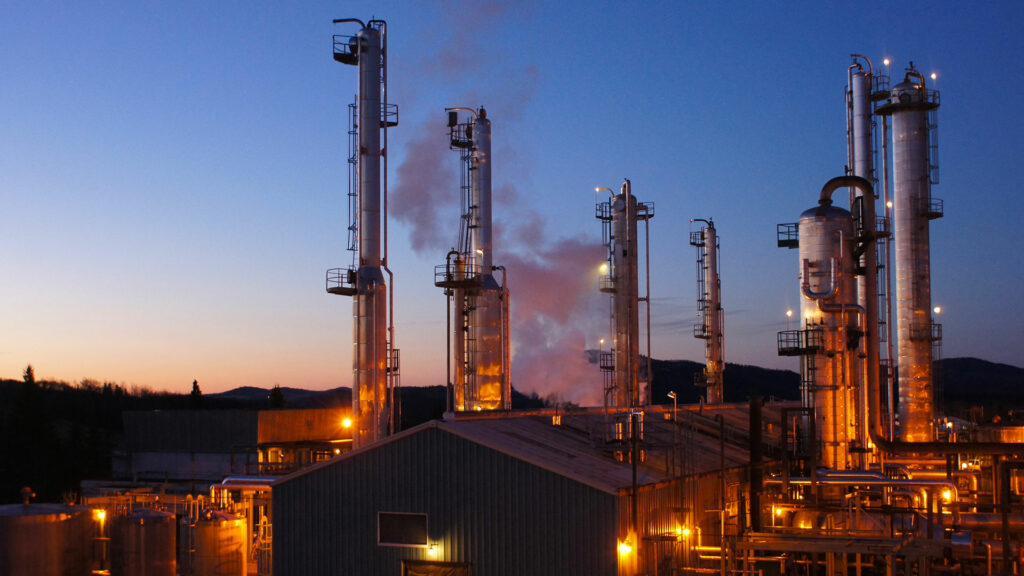At SysEne, we believe that energy efficiency is the hidden gem for industrial decarbonization efforts. While it slowly gains attention as an untapped resource for energy and carbon reduction efforts across multiple sectors, understanding its true value as a “negative-cost fuel” is increasingly important.
Industry has largely agreed that reducing greenhouse gas (GHG) emissions is critical to combatting climate change, and SysEne understands that improving energy efficiency in industry is a key strategy for achieving this goal. Industrial processes are responsible for a significant portion of global GHG emissions, with manufacturing, mining, and construction among the most energy-intensive sectors. Directly and indirectly, the oil and gas industry accounts for 42% of global GHG emissions. The extraction and processing of oil and gas account for 9% of emissions, while the use of the fuels account for the other 33%.
Canadian oil and gas companies are facing increasing pressure to reduce their GHG emissions and improve energy efficiency. With climate change becoming an increasingly urgent issue, the industry acknowledges that it must take action to reduce its impact on the environment and contribute to a more sustainable future. This is evident in their published emissions reduction targets and the creation of pan-industry organizations, such as The Pathways Alliance.
In Alberta, Emissions Reduction Alberta (ERA) utilizes carbon tax revenue to provide incentives and grants to encourage businesses to invest in technologies that reduce emissions and improve energy efficiency. Meanwhile, the Technology Innovation and Emissions Reduction (TIER) program is the regulatory framework that administers the provincial industrial carbon pricing and emissions trading system based on ratcheting benchmarks. This “carrot and stick” approach is a typical mechanism to create a meaningful price signal for energy efficiency and emissions reduction.

Improving energy efficiency in industrial operations can have a significant impact on reducing GHG emissions. By using less energy to produce the same output, industrial facilities can reduce their carbon intensity and save money on energy and carbon costs. This can be achieved through a range of measures, including upgrading equipment and technologies, optimizing processes and operating procedures, and improving maintenance practices. SysEne’s Facility Energy and GHG Assessments routinely find 10% or more in potential energy efficiency opportunities. It cannot be understated how significant those savings can be for industrial facilities that consume hundreds of gigajoules (GJ) and millions of dollars in energy on a monthly basis.
One of the most effective ways to improve energy efficiency is by implementing energy management systems (EMSs or EnMSs). These systems allow organizations to systematically identify areas where energy use can be reduced, set KPIs to track progress towards energy-saving goals, and prioritize energy efficiency measures based on their potential impact and cost-effectiveness. SysEne has successfully implemented multiple EMSs in a variety of industrial sectors, including Canada’s first EMS for an upstream oil and gas producer (link to Pemoco case study). This system identified a 13% reduction in fluid pumping costs in the first year alone.
Improving energy efficiency in industrial processes, especially in oil and gas, can lead to significant reductions in Canadian and global GHG emissions. The actual amount of GHG emissions that can be saved through efficiency improvements varies depending on the sector, process, and technology in question. However, there are several studies and reports that provide estimates of potential emissions savings.
- According to the International Energy Agency (IEA), energy efficiency improvements in industry have the potential to reduce global GHG emissions by 2.5 to 4 gigatonnes of CO2-equivalent per year by 2050. This tantamount to the annual emissions of Japan and Germany combined.
- A report by the American Council for an Energy-Efficient Economy (ACEEE) found that improving industrial energy efficiency in the United States could lead to emissions reductions of 19% by 2050, which is equivalent to 400 million tonnes of CO2 per year.
- In Canada, a report by the National Energy Board estimated that improving energy efficiency in the industrial sector could result in emissions reductions of 47 million tonnes of CO2 per year by 2035, which is equivalent to taking 10 million cars off the road.
Energy efficiency in the oil and gas sector goes beyond reducing GHG emissions. It also provides significant economic benefits by reducing operating costs, mitigating the risk of escalating carbon tax rates and increasing corporate competitiveness. Energy-efficient technologies and practices can also improve safety, reduce downtime, and increase production capacity, leading to important add-on cost savings and environmental benefits.
Unlocking energy efficiency in industry is a critical and thus far highly underutilized strategy for reducing GHG emissions and combatting climate change. SysEne is adamant that by implementing energy-efficient technologies and practices, businesses can save money, improve their operational efficiency, and contribute to a more sustainable future. Governments, businesses, and individuals all have a role to play in promoting energy efficiency and resolving the value of this hidden gem.
Rob Eagleson, P.Eng
SysEne Consulting Inc.
Related Insights
Check out some of the other tech innovation taking place in
the public transit space.